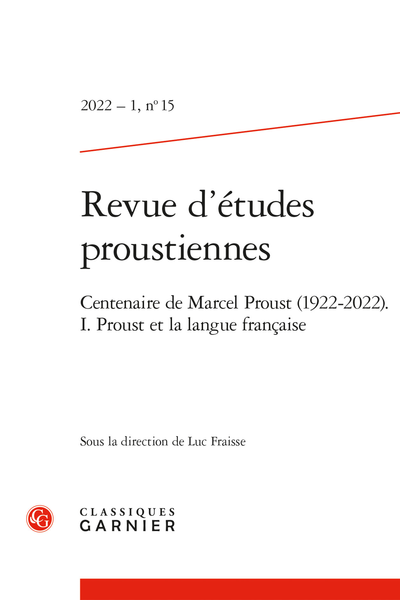
Contents
- Publication type: Journal article
- Journal: Revue d’études proustiennes
2022 – 1, n° 15. Centenaire de Marcel Proust (1922-2022). I. Proust et la langue française - Pages: 7 to 8
- Journal: Journal of Proustian Studies
- CLIL theme: 4027 -- SCIENCES HUMAINES ET SOCIALES, LETTRES -- Lettres et Sciences du langage -- Lettres -- Etudes littéraires générales et thématiques
- EAN: 9782406132158
- ISBN: 978-2-406-13215-8
- ISSN: 2430-8218
- DOI: 10.48611/isbn.978-2-406-13215-8.p.0007
- Publisher: Classiques Garnier
- Online publication: 04-27-2022
- Periodicity: Biannual
- Language: French
Sommaire
L’œuvre de Marcel Proust. Note sur les éditions utilisées /
The works of Marcel Proust. Notes on the editions used 9
Avertissement /
Notice 11
Allocution d’ouverture par M. Xavier Darcos,
de l’Académie française, Chancelier de l’Institut de France
(lue par Yves Bruley, directeur de France Mémoire) /
Opening address by Mr. Xavier Darcos
of the Académie française, chancellor of the Institut de France
(read by Yves Bruley, director of France Mémoire) 13
Luc Fraisse
Marcel Proust et la langue française /
Marcel Proust and the French language 19
Emmanuelle Kaës
La phrase de Proust et le latin scolaire /
Proust’s sentence and school Latin 29
Damien Crelier
Le Saint-Simon de Marcel Proust. Langue classique
et décadence dans À la recherche du temps perdu /
Marcel Proust’s Saint-Simon. Classical language
and decadence in À la recherche du temps perdu 51
Ilaria Vidotto
Proust et la phrase française /
Proust and the French sentence 69
Philippe Le Guillou
Les mots, les noms, le style /
Words, names, style 89
Jérôme Bastianelli
Proust traducteur de l’anglais /
Proust translating from English 97
Stéphane Chaudier
Proust et les mots du commun /
Proust and a shared vocabulary 109
Jean-Christophe Pellat
Les caractères des participes chez Proust ou
Les participes chez Proust ont-ils « un fichu caractère » ? /
The personality types of participles in Proust, or
Do the participles in Proust have “bloody character”? 131
Philippe Blay
Proust et le langage musical.
Composer sa musique littéraire /
Proust and the language of music.
Composing his literary music 155
Luc Fraisse
Proust et la langue philosophique /
Proust and philosophical language 173
Prononcer la langue de Proust. Entretien de Luc Fraisse
avec Loïc Corbery, Sociétaire de la Comédie française /
Pronouncing the language of Proust. Luc Fraisse’s interview
with Loïc Corbery, member of the Comédie française 187
Résumés/Abstracts 195